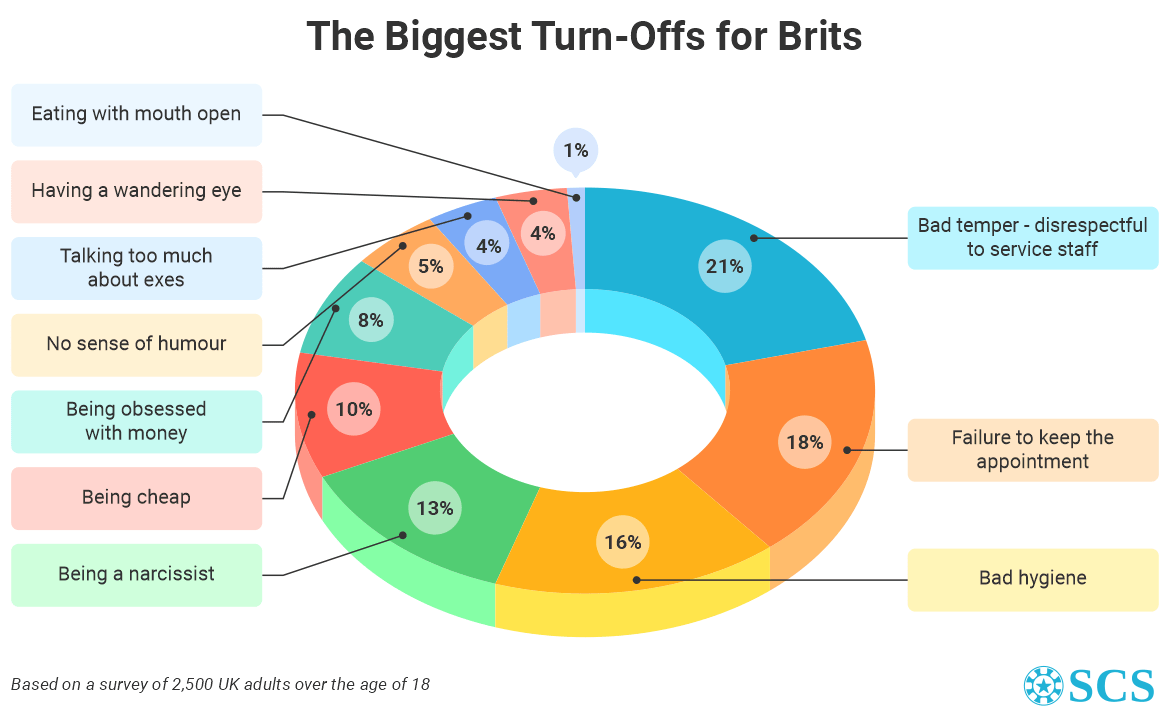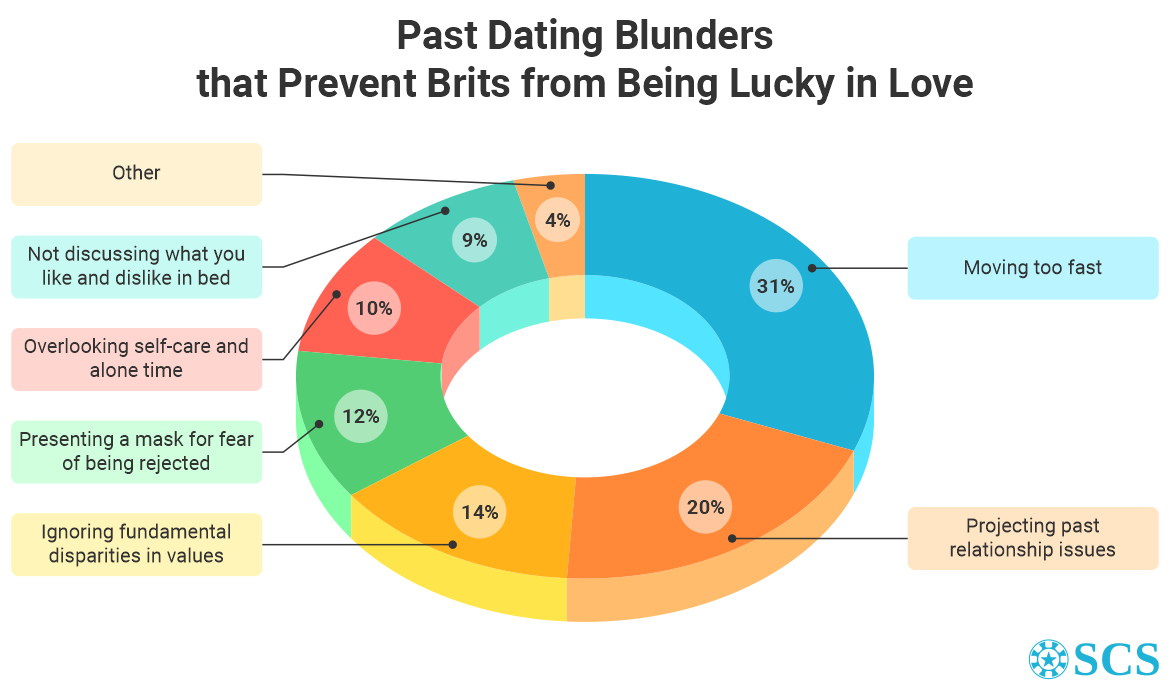Everyone has their turn-offs when it comes to a prospective partner, and while some are issues practically everyone can agree are deal breakers, others are utterly subjective. You can’t be an expert in the game of love, that is for sure. The good news is that you don’t have to be. Knowing what makes Brits look sideways at their date is enough to greatly reduce the chances of the love of your life walking away.
This is where the team at SuperCasinoSites steps in. Spurred on by the ongoing appetite for TV dating shows such as Love Island and Too Hot to Handle, where people hope to find some sort of guidance on how to find their perfect match, we decided to ask Brits about their biggest ‘icks’ on a first date. A survey of 2,500 UK adults over the age of 18 was conducted, revealing their top ten first-impression turn-offs, what behaviour to avoid at the start of a relationship, and who is most likely to be lucky in love.

First Date ‘Icks’
It is widely believed that the first impression is the most accurate, and we have to admit this is especially true for romantic dates. In our survey, we asked people what could make them quickly dismiss the notion of being romantically involved with someone, or in other words, what their most common ‘icks’ are.
If you are looking to date in the UK, you have to treat waiters, bartenders, and cashiers with caution, as being disrespectful to service staff is cited as a turn-off by 21% of our respondents. Our survey also found that plenty of Brits are intolerant of partners who don’t arrive on time (18%), have poor hygiene (16%), or are too narcissistic and speak mainly about themselves (13%).
Money appeared twice in our list of first-date turn-offs cited by survey respondents. For 10% of people, the red flag is raised when their date does not offer to pay or split the bill. On the other hand, 8% said that making a song and dance of your good financial standing, or generally being obsessed with money, was repulsive.
So, what else should you consider before going on your first date with someone? Regardless of gender, Brits appreciate someone with a sense of humour, so look for the funny side of situations you get into with your partner. 5% of survey respondents would be turned off if you didn’t have a good sense of humour..
Our respondents were equally given the ‘ick’ by their date if they talked too much about an ex, or they had a noticeably wandering eye, with 4% of responses indicating each. 1% of those surveyed stated they would not go on a second date with someone who eats with their mouth open, or munches and sips loudly.

Mistakes to Avoid in a New Romance
Let’s assume your first date went well and you’ve started a romantic relationship, but your joint journey of love is still in its early stages. The initial dopamine rush should not make you forget that new relationships are very delicate, and it is vital to watch for signs of potentially incompatible behaviour. To assess the most common pitfalls, we asked our respondents to list mistakes they made in previous relationships that contributed to the ending of romances. We grouped the reasons in several categories.
Although ignoring fundamental disparities in values and worldview is seen as a major error, 14% of people have done so in their past. These disparities include discovering their partner does not want children, having opposing opinions on how to spend their lives together, and liking completely different leisure activities.
When it comes to romantic relationships, there is no timeframe for when it is appropriate to take the next step. It’s clear though, that handing your partner a key to your house, telling them that they are the one, or insisting on introducing them to your parents as early as the second week, is a bad idea. Our survey shows that 31% of Brits have ended a potentially wonderful romance because of the other person moving too fast.
It is natural for all of us, regardless of age, to carry some “baggage” from the past. In relationships, this could be a cheating, aggressive, or constantly absent ex for example. Projecting that onto a new partner is a mistake reported by 20% of our survey respondents.
Here are some other pitfalls to avoid when beginning a new romance:
- Presenting a mask for fear of being rejected (12%)
- Overlooking self-care and alone time (10%)
- Not talking about what you like and do not like in bed (9%)
- Other (4%)
Love Feng Shui
Finding love can be a tough task, even if you know how to handle a romantic situation and feel quite comfortable with how you behave on a first date. Sometimes doing the right things is simply not enough and you need to arrange your daily life a little to help love happen.
Feng Shui teaches us how to arrange objects to positively influence health and happiness, but what about love? How do we organise our lives for love feng shui? We asked our respondents a series of questions about their age and star sign, when and where they met their partner, and how happy they are right now. Our aim was to figure out who is more likely to meet their soul mate, and to give you some tips on how to improve your chances.
It is widely believed that the way we meet someone could influence how the relationship unfolds. According to our survey, July is the month when people are most likely to find ‘the one’, followed by December. This is hardly surprising, given that these are holiday and celebration months, when people spend a lot of time having fun. January was identified as the least probable month to find a loved one, and heartbreaks were most common for those who met their partner in May.
Interestingly, our findings show that the average length of a relationship can be related to your age at the time of meeting your partner (along with other factors, of course). The highest proportion of respondents (41%), who have had a relationship lasting at least two years, met their partner while they were in their 30s.
Aries (21st of March – 19th of April) is the most common star sign among those currently in a relationship with 19% of respondents, followed by Leo (23rd of July – 22nd of August) with 16%, and Virgo (23rd of August – 22nd of September) with 15%. But don’t be disheartened if your sign is not among these lucky three. While cosmic alignment may be suggestive of a romantic journey, everyone is unique and capable of tipping the scale in their favour.
Our survey found that Pisces (19th of February – 20th of March) have been on the fewest bad dates, with only 24% of them having experienced one. Gemini (21st of May – 21st of June) and Libra (23rd of September – 22nd of October) also do well at the start of a relationship.
Final Thoughts
Perhaps you don’t agree that some of the dating ‘icks’ we mentioned are actually that bad. While it is true that people were not created equal, we still advise you to think twice. The good thing is that, unlike in dating shows, in real life nobody watches your every move. This gives you the freedom to make mistakes, learn from them, and have more success in future.
